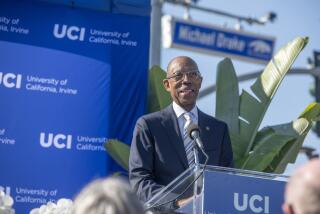Cal State trustees OK executive raises
- Share via
Despite protests from faculty, students and state officials, trustees of the Cal State University on Wednesday awarded pay increases to 26 top administrators and campus presidents that averaged nearly 12% and in some cases amounted to raises of more than $44,000 a year.
Trustees, voting 14-2, said the raises were needed to help the 23-campus system recruit and keep talented administrators in a competitive national market. They contend the new salaries still will be substantially below those at rival schools, even though system Chancellor Charles B. Reed will be paid $421,500 and campus presidents will average about $292,000, plus annual housing allowances worth as much as $60,000 and other perks.
However, Lt. Gov. John Garamendi, who is an ex-officio trustee, called the raises “a very, very serious mistake” and “outrageous,” given tight budgets and rising student fees. Addressing the trustees’ meeting in Long Beach, he stressed that there is no evidence that administrators are leaving because of low pay or that the university has hiring trouble.
Including other recent raises, the administrators’ pay will have gone up 34.7% in three years. Those cumulative hikes are larger than the yearly salaries of some university lecturers and janitors, Garamendi complained. He and Trustee Ricardo F. Icaza, who is a labor union leader, cast the no votes.
Trustees in favor of the raises cited a survey, sponsored by the California Postsecondary Education Commission, that examined salaries at 20 universities, mainly public, across the country. That survey found that top Cal State salaries lagged the average last year by 46%.
Reed said many strong, out-of-state candidates eventually turned down Cal State offers because of “the compensation lags in California.”
The hikes come at a time when the Cal State and UC systems have been under much legislative and media scrutiny into the secretive and sometimes improper ways executive salaries and perks were handled in the past. The Bureau of State Audits is currently looking into the Cal State compensation issues.
Lillian Taiz, president of the California Faculty Assn., said that the raises seem more fitting for the corporate world than for a public university at which students have trouble finding room in required courses.
Taiz suggested the administrators receive, if anything, just the nearly 5% annual raises faculty obtained last spring after lengthy negotiations. “If it’s good enough for us, it’s good enough for them,” said Taiz, a history professor at Cal State Los Angeles.
Retroactive to July 1, 2007, the raises affect 22 campus presidents and four system officials and excludes vacancies and recent hires. Some of the changes are to recognize longevity of service and the special challenges of large campuses, officials said.
Reed’s pay jumps $44,500 to $421,500, and some campus presidents will see similarly large increases. For example, James M. Rosser, who has been president of Cal State Los Angeles since 1979, will make $325,000 after a $43,252 raise.
Trustee Herbert Carter conceded that the raises will not be popular politically, but he posed three questions: “Do the numbers add up? Does the proposed policy sound OK? Does it feel right? I believe that all three of these questions can be answered affirmatively.”
However, many student leaders disagreed.
Adam Haverstock, Associated Students president at Cal State Northridge, said the pay raises went far beyond what an administrator needs to support a decent lifestyle.
“I don’t want to have a CSU executive who wants to work in California only for the pay. I want them to work here because they care about education in California,” he said.
Under bills passed by the Legislature and awaiting review by Gov. Arnold Schwarzenegger, the University of California and Cal State systems would have to conduct more business in public, including action on executive pay, and limit the transition and teaching pay that high administrators often receive after leaving those posts.
Assemblyman Anthony Portantino (D-La Cañada Flintridge), who wrote one of those bills and is chairman of the Higher Education Committee, urged the trustees not to take action on the raises until the state auditor completes the review of Cal State’s compensation policies. In a telephone interview after the vote, he described his reaction as “somewhere between sad and outraged.”
State Sen. Leland Yee (D-San Francisco), who wrote the other bill, said in a statement: “It is completely irresponsible for the CSU to continue handing out exorbitant pay raises to the university’s top brass, while the salaries of the faculty and staff lag behind and students are asked to foot the bill.”
--
--
Begin text of infobox
Cal State raises
Here are the raises and new salaries for presidents of Cal State campuses in Southern California approved Wednesday:
* Bakersfield, Horace Mitchell, $26,000 to $285,000
* Channel Islands, Richard R. Rush, $34,101 to $275,000
* Fullerton, Milton A. Gordon, $29,775 to $295,000
* Long Beach, F. King Alexander, $29,121 to $320,329
* Los Angeles, James M. Rosser, $43,252 to $325,000
* Northridge, Jolene Koester, $29,775 to $295,000
* Pomona, J. Michael Ortiz, $44,734 to $292,000
* San Bernardino, Albert K. Karnig, $43,445 to $290,000
* San Diego, Stephen L. Weber, $27,221 to $299,435
* San Marcos, Karen S. Haynes, $31,127 to $270,568
(Cal State Dominguez Hills President Mildred Garcia was hired recently at $295,000 and will not receive a raise.)
--
Source: California State University
More to Read
Sign up for Essential California
The most important California stories and recommendations in your inbox every morning.
You may occasionally receive promotional content from the Los Angeles Times.











